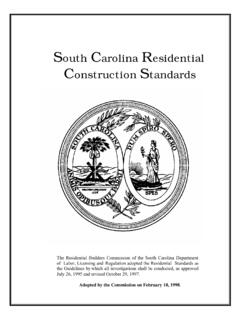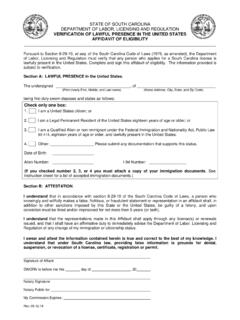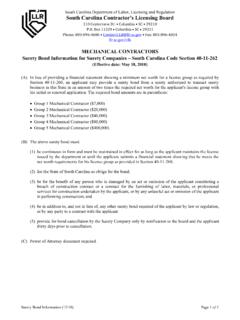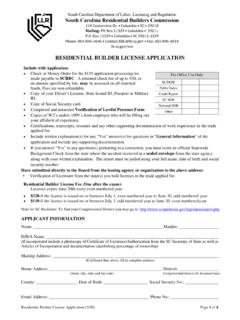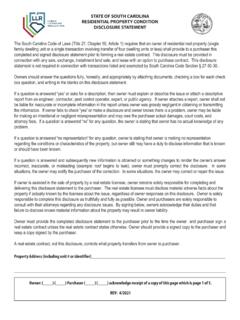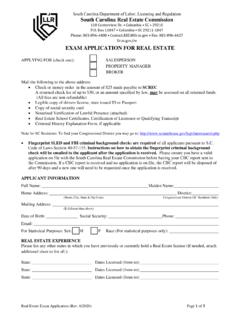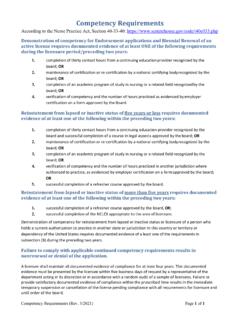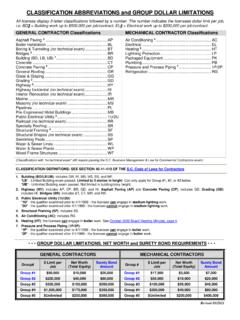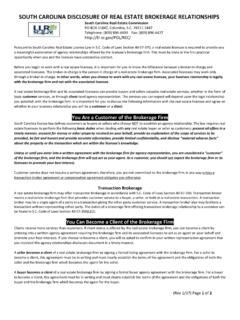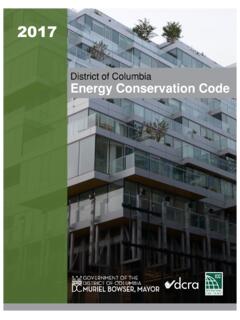Transcription of Building Codes in Effect for South Carolina
1 Building Codes in Effect for South Carolina The mandatory Codes referenced in , Ann. 6-9-50(1976, as amended), modified and adopted by the South Carolina Building Codes Council, must be enforced by every South Carolina municipality and county. Appendices to the mandatory Codes may not be used by municipalities and counties unless the appendices are specifically adopted as a local modification by the Building Codes Council. The latest edition of the permissive Codes referenced in code Ann. 6-9-60 (1976, as amended) may be adopted by municipalities and counties via ordinance. Adoption of the mandatory Codes and permissive Codes does not include the chapters, sections or provisions addressing administrative policies or procedures. Administrative policies and procedures are the sole responsibility of each local jurisdiction. If the governing body of a local jurisdiction desires to use the administrative provisions in one or more of the adopted Codes , it must first adopt the chapters or sections by ordinance.
2 In lieu of adopting the administrative provisions contained in the adopted Codes , the governing body of a local jurisdiction may develop specific administrative policies and procedures for the operation of its Building Inspection Department. If administrative policies and procedures are developed at the local level, they must be adopted by ordinance before they can take Effect . On August 22, 2018, the Council modified and approved appendices and mandatory Codes to be used in every South Carolina municipality and county. The Council established the implementation date for local jurisdictions as January 1, 2020. The mandatory Codes are: 2018 international Building code with SC modifications; or 2018 South Carolina Building code 2018 international Residential code with SC modifications; or 2018 South Carolina Residential code 2018 international Fire code with SC modifications; or 2018 South Carolina Fire code 2018 international Plumbing code ; or 2018 South Carolina Plumbing code 2018 international Mechanical code with SC modifications; or 2018 South Carolina Mechanical code 2009 international energy conservation code 2018 international Fuel Gas code with SC modifications; or 2018 South Carolina Fuel Gas code 2017 National Electrical code (NEC) with SC modifications The latest edition of ICC/ANSI , Accessible and Useable Buildings and Facilities, is adopted by the Accessibility Act, code Ann.
3 10-5-210 et seq., and mandatory for use in all municipalities and counties within the State. Although other standards for Building accessibility exist, the latest published edition of the ICC/ANSI is the only accessibility document required by state law to be enforced by the local Building officials. All plan reviews and inspections conducted by local Building inspection departments, therefore, will be based on ICC/ANSI It is important to note, however, that other accessibility documents are also law and cannot be ignored. Legal action can be taken against a Building owner, manager or any person involved in the design or construction/renovation of a Building or structure requiring accessibility under any of the accessibility laws. Therefore, before construction or renovation of a Building or structure that requires accessibility is started, all applicable accessibility laws should be considered. Additional accessibility laws that must be considered and their enforcement entities include the: Americans with Disabilities Act (ADA), published and enforced by the US Department of Justice (DOJ); Fair Housing Act Amendments of 1988, published and enforced by the US Department of Housing and Urban Development (HUD); and, South Carolina Fair Housing Law, published and enforced by the SC Human Affairs Commission.
4 The Building energy Efficiency Standards Act is adopted by statute and mandatory for use in all jurisdictions within the state. code Ann. 6-9-60 (1976, as amended), allows municipalities and counties to adopt the latest editions of the following nationally recognized Codes . These permissive Codes must first be adopted by ordinance before enforcement can begin. The permissive Codes are the latest editions of the international Property Maintenance code ; international Existing Building code ; international Performance code ; and international Swimming Pool and Spa code (Note that while the international Existing Building code is a permissive code in South Carolina , this code was adopted by reference in the international Building code (Chapter 34 ) which is a mandatory code . In 2012, the Council moved this international Building code reference to the international Existing Building code to Chapter 1 Administration, Section of the South Carolina Building code . As such, the South Carolina Existing code is still a permissive code ).
5 Order copies of the international Codes , the National Electrical code , or the ICC/ANSI document. code Adoption History: The following information is provided for research purposes and may be used to verify the official dates for which local jurisdictions were or are required to enforce certain editions of the mandatory Building Codes . The international code Series was developed as a joint project by the Southern Building code Congress, international , the international Conference of Building Officials and the Building Officials and code Administrators, international (referred to as model code organizations) and replaced the Standard, National and Uniform Building code Series. The 1997 Editions of the Standard, National and Uniform Codes (which were regional), and the 1995 Edition of the CABO One and Two Family Dwelling code (which was national), were the last to be published. The international Building code Series replaced those documents and provided a single set of National Codes .
6 Simultaneously, the three model code organizations merged and created the international code Council. All Codes , training, and code Enforcement Officer Certification examinations for the State of South Carolina are now based on the international code series. Prior to June 13, 1997, local jurisdictions that desired to adopt Building Codes were permitted to do so by local ordinance. If a jurisdiction did adopt Building Codes , it was required to adopt only the Codes authorized by the Building Codes Act. Once adopted, the jurisdiction was obligated to continue the adoption of each new edition within one year after it was made available by the publisher. The implementation date for enforcement was established by the local jurisdiction. Starting July 13, 1997, all local jurisdictions that did not legally opt-out of the mandatory Building code program were required to adopt Building Codes by local ordinance, after they were authorized by the Council. The Council was also required to establish the date of implementation for each of the adopted Codes .
7 Beginning July 2, 2003, the Council was charged with the responsibility for adopting all mandatory Building Codes and establishing the date of implementation for the local jurisdictions. Starting with the 2006 code adoption cycle, the Council, instead of the local jurisdictions, began adopting the appendices as needed. Building Codes authorized or adopted by the Building Codes Council and their corresponding implementation dates, starting with the current Codes and going back to the 2000 international code Series, include the following: Codes Adopted 2018 international Residential code 2018 international Building code 2018 international Fire code 2018 international Plumbing code 2018 international Mechanical code 2018 international Fuel Gas code 2009 international energy conservation code 1 2017 National Electrical code Adoption Date August 22, 2018 August 22, 2018 August 22, 2018 August 22, 2018 August 22, 2018 August 22, 2018 April 2, 2012 August 22, 2018 Implementation Date January 1, 2020 January 1, 2020 January 1, 2020 January 1, 2020 January 1, 2020 January 1, 2020 January 1, 2013 January 1, 2020 2015 international Residential code 2015 international Building code 2015 international Fire code 2015 international Plumbing code 2015 international Mechanical code 2015 international Fuel Gas code 2009 international energy conservation code 1 2014 National Electrical code August 29, 2012 August 29, 2012 August 29, 2012 August 29, 2012 August 29, 2012 August 29, 2012 April 2, 2012 August 29, 2012 July 1.
8 2016 July 1, 2016 July 1, 2016 July 1, 2016 July 1, 2016 July 1, 2016 January 1, 2013 July 1, 2016 2012 international Residential code 2012 international Building code 2012 international Fire code 2012 international Plumbing code 2012 international Mechanical code 2012 international Fuel Gas code 2009 international energy conservation code 1 2011 National Electrical code 2 August 29, 2012 August 29, 2012 August 29, 2012 August 29, 2012 August 29, 2012 August 29, 2012 April 2, 2012 August 29, 2012 July 1, 2013 July 1, 2013 July 1, 2013 July 1, 2013 July 1, 2013 July 1, 2013 January 1, 2013 July 1, 2013 2009 international Residential code 2009 international Building code 2009 international Fire code 2009 international Plumbing code 2009 international Mechanical code 2009 international Fuel Gas code March 22, 2010 March 22, 2010 March 22, 2010 March 22, 2010 March 22, 2010 March 22, 2010 Not Implemented 3 Not Implemented 3 Not Implemented 3 Not Implemented 3 Not Implemented 3 Not Implemented 3 2008 National Electrical code March 30, 2009 July 1, 2009 2006 international Residential code 4 November 28, 2007 July 1, 2009 2006 international Building code November 28, 2007 July 1, 2008 2006 international Fire code November 28, 2007 July 1, 2008 2006 international Plumbing code November 28, 2007 July 1, 2008 2006 international Mechanical code November 28, 2007 July 1, 2008 2006 international Fuel Gas code 2006 international energy conservation code 1 November 28, 2007 November 28, 2007 July 1, 2008 July 1, 2008 2005 National Electrical code February 22, 2006 July 1, 2007 2003 international Residential code May 26, 2004 July 1, 2005 2003 international Fuel Gas code May 26, 2004 July 1, 2005 2003 international Building code May 26, 2004 January 1, 2005 2003 international Fire code May 26, 2004 January 1, 2005 2003 international Plumbing code May 26.
9 2004 January 1, 2005 2003 international Mechanical code May 26, 2004 January 1, 2005 2003 international energy conservation code May 26, 2004 January 1, 2005 2002 National Electrical code May 22, 2002 July 1, 2002 2000 international Residential code May 24, 2000 July 1, 2002 2000 international energy conservation code May 24, 2000 July 1, 2001 2000 international Building code May 24, 2000 July 1, 2001 2000 international Fire code May 24, 2000 July 1, 2001 2000 international Plumbing code May 24, 2000 July 1, 2001 2000 international Mechanical code May 24, 2000 July 1, 2001 2000 international Fuel Gas code May 24, 2000 July 1, 2001 Footnotes: 1. The 2006 international energy conservation code (IECC) was adopted by the SC Legislature as the minimum standard for compliance with the State energy Standard, thus removing it from the normal adoption process. The legislature updated the IECC to the 2009 Edition during the 2012 legislative session (Act 143) with an effective date of January 1, 2013.
10 Future updated versions must also be adopted by statutory amendment. 2. The Building Codes Council included the adoption of the National Electrical code with the international code Series, starting with the 2012 code Adoption Cycle. 3. The 2009 international code Series was formally adopted by the Building Codes Council May 10, 2010. Implementation did not occur, however, due to a request to remove the regulations from the administrative procedures process by the South Carolina House Labor, Commerce and Industry Committee. 4. The implementation date for the international Residential code was delayed until July 1, 2009 by 2008/2009 budget proviso 182 ( ). History of the SC energy Standards The SC energy Standards started as House Bill 2863 (Act 156) and became effective 7/6/1979. The standards were adopted as state law and were applicable and mandatory in every municipality and county in South Carolina . In 1979, the State Standard referenced the current addition of Appendix J energy conservation of the 1979 edition of the Standard Building code , which in turn referenced the code for energy conservation in New Buildings (published jointly by the Southern Building code Congress, international Conference of Building Officials and Building Officials, code Administrators international and National Conference of States for Building Codes and Standards) and ASHRAE Standard 90 as methods of compliance with state law.
